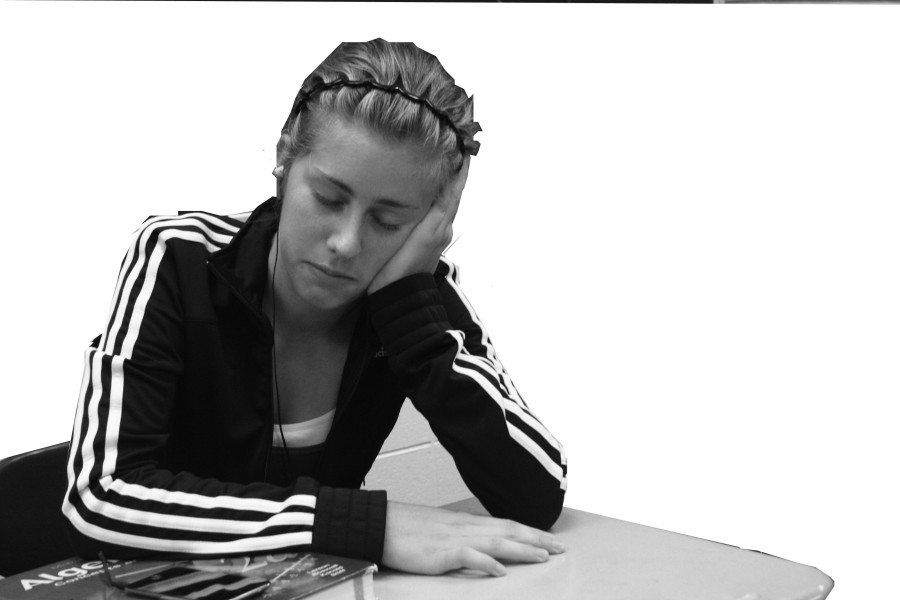Losing a few hours of sleep is common for the average teenager, according to Psychology Today Magazine. Big papers due the next day and parties with friends guarantee a full nine hours of sleep every night is not easily attainable.
Recent studies, however, prove there’s more at stake for teens than a day of feeling groggy. According to an article by the American Psychological Association, teens with sleep deprivation, especially over an extended period of time, are more likely to be victim to car accidents, poor grades, and the development of a psychopathology like depression or ADHD.
“I usually don’t go to bed until 2,” Kaylee Hartman, sophomore, said. “The mornings are pretty rough, and last year I would usually fall asleep in my biology and English classes.”
Hartman says she then wakes up at 6, four short hours after going to bed. In the American Psychological article, James B. Maas, PhD, says that teens need at least 9 to 10 hours of sleep to properly retain alertness, cognition, memory, and understanding.
“I strive to be a straight A student,” Meghan Gelinas, sophomore, said. “But if I don’t get enough sleep, I find it really hard to listen or learn.”
The American Psychological article reported a study conducted by Brown University on student’s grades in relation to their bed times. Students who claimed to be earning C’s, D’s, or F’s went to bed at least 40 minutes later than students earning A’s and B’s.
“It’s a downward spiral,” Valerie Early, health specialist at Nutrition Connection Balance in Schaumburg, said. “Teens are already over worked and over stressed, and without enough sleep, concentrating becomes more difficult and then they fall behind in class.”
Gelinas tries to get in bed by 9, and when she does, she says it’s because she finished her homework right when she arrived home from school.
“I make it easier on myself,” Gelinas said, “I’m not worrying about not completing something when I’m trying to sleep.”
With enough sleep, Gelinas also says she feels more confident the next day. Early finds this to be no mistake, as the right amount of sleep also decreases the possibility of having depression, anxiety, and other mental illnesses.
“With enough rest, your brain is able to repair tissue and balance out neurotransmitters,” Early said.
Neurotransmitters like serotonin, dopamine, and GABA help the brain control irritability and content. According to Early, lack of sleep creates an imbalance of these chemicals, leaving the brain more vulnerable to psycho-pathologies and unable to cope with stress and hormones.
“The imbalance brings on depression, obsessive thinking, ADHD,” Early said. “A person also might have stronger cravings for junk food and have to worry about weight gain.”
With a consistent bed time of 2 o’clock in the morning, Hartman says during the day she will feel cranky and easily annoyed if someone tries to talk to her.
Hartman blames the internet and texting for her lack of sleep, which Early says a teen should not be doing an hour before bed.
“The computer, TV, and cell phone are unnecessary distractions,” Early said, “They should be turned off 1 to 2 hours before bed.”
Without enough time to rest, the American psychological association notes that a teen’s health and grades are not the only price to pay, as sleep deprivation can cost a teen their life.
“Drowsiness and fatigue cause more than 100,000 traffic accidents each year—and young drivers are at the wheel in more than half these accidents,” the article reads.
Gregg Pilaski, Lake Zurich Police officer, has pulled over teens and adults who were driving poorly when tired. He says that driving while sleepy is as dangerous as driving while drunk.
“When I see someone driving off-shoulder or slightly swerving in lanes, I’ll pull them over and expect them to be drunk, and really they’re just tired and falling asleep at the wheel,” Pilaski said, “I’ll write a ticket for that.”
The solution is simple, however, and can keep a teen from living with dire consequence. “Always switch drivers, or make sure to stretch, drink some coffee, and get some fresh air,” Pilaski said, “Even call and say you’ll be late…it’s not worth killing someone or yourself.”
Hartman, who is still too young to drive, says she knows she needs sleep, but always puts it off because she has to deal with everything else in her life first. Early recognizes this, and says teens must make more time to sleep.
“Everyone has things to do and becomes busy, but teens need to seek longer and deeper sleep,” Early said. “No one can function without it.”

